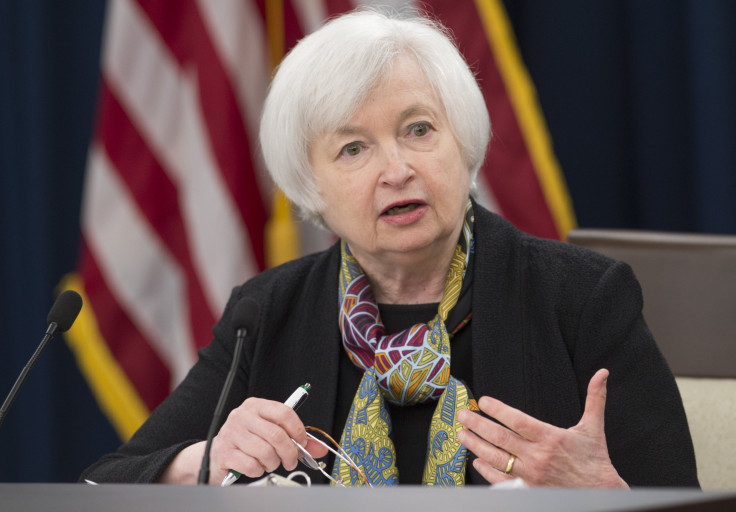Fed Chairwoman Janet Yellen Expected To Reiterate Dovish Stance Despite Dissent

When U.S. Federal Reserve Chairwoman Janet Yellen speaks at the Economic Club of New York Tuesday, investors will be watching for clues regarding the central bank’s plans for future interest rate hikes.
Since December, when the Fed lifted its benchmark rate for the first time since 2006 and laid out a path that included four rate hikes in 2016, Yellen has adopted an increasingly dovish stance. Now, most Fed officials believe that the key rates would be raised only twice this year.
“[Yellen’s speech] will be more embellishment of what we heard [at her news conference] on March 16,” James Glassman, an economist at JPMorgan Chase, told Marketwatch.
Last week, in comments made after a two-day meeting of Fed governors and regional bank presidents, Yellen moderated expectations of future rate hikes, adding that “achieving economic outcomes similar to those anticipated in December will likely require somewhat lower interest rates.”
On Tuesday, Yellen is expected to “reinforce the dovish tone,” Dana Saporta, an economist with Credit Suisse, told Marketwatch.
A dovish tone would also be in line with concerns aired by Yellen last week and a pause in the core personal consumption expenditure price index — the Fed’s preferred inflation gauge — in February. Last month, the PCE increased at a slower-than-expected rate of 1.7 percent, after a similar increase in January.
The key gauge has consistently been running lower than the central bank’s 2 percent target.
“Ongoing economic growth and additional strengthening in labor market conditions are important factors underpinning the inflation outlook,” Yellen said on March 16. “The stability of longer-run inflation expectations cannot be taken for granted. ... In considering future policy decisions, we will carefully monitor actual and expected progress toward our inflation goal.”
Yellen’s reluctance to raise rates has irked some members of the Federal Open Market Committee. In recent days, four of the 17 FOMC members have publicly aired their disagreement with the dovish guidance. However, this is unlikely to affect Yellen’s monetary policy decision in April, when only one of the four dissenters — which include chiefs of the San Francisco, Atlanta, Kansas City, and Philadelphia Federal Reserves — are allowed to vote.
“The risks are if anything that she's going to offset some of the more hawkish rhetoric we've seen," Ian Lyngen, senior Treasury strategist at CRT Capital, told CNBC.
© Copyright IBTimes 2024. All rights reserved.






















